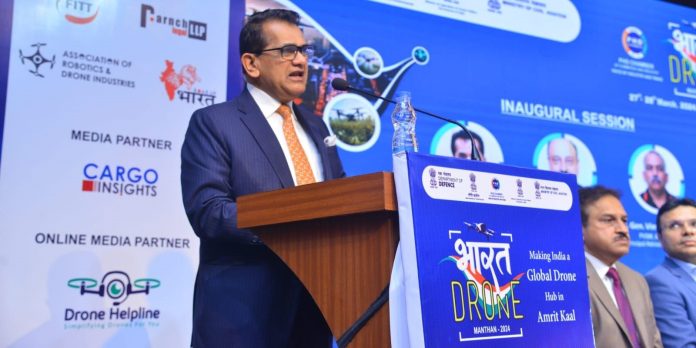At PHDCCI manthan, Amitabh Kant said India needs to make a quantum jump in drone making just it has done in mobile manufacturing.
NEW DELHI, Mar 28 (The CONNECT) – The integration of drones within Industry 4.0 will drive inclusive growth, positioning India as a global hub of drone technology, according to Amitabh Kant, G 20 Sherpa of India.
With the aim of becoming a $35 trillion economy by 2047, India recognizes immense opportunities in the drone sector. The government has taken steps to support this growth through initiatives like the PLI scheme, fostering a thriving startup ecosystem in the drone economy.
The sector provides strong growth potential, with the annual sales turnover projected to rise from 60 crores in 2021 to around 500 crores in 2025, reaching approximately 1,500 crores in the next 2-3 years.
The global market is expected to reach $55 billion by 2025 and $100 billion by 2030. To capitalize on this growth, India aims to capture at least 10% of the market share, aspiring to become a $10 billion economy in the drone sector, Kant said speaking at PHDCCI’s ytwo-day BHARAT DRONE MANTHAN -2024 that ended today.
The theme of the event was “Making India a Global Drone Hub in Amrit Kaal”.
Kant said, drone manufacturers should adopt a very holistic approach encompassing rigorous testing, continuous monitoring, and robust validation processes while developing production solutions. Integration of sensors and 5G in drones will revolutionize their capabilities.
Drones equipped with advanced sensors and artificial intelligence will facilitate the collection and analysis of data. In real-time, they will enhance decision-making processes across industries, and the integration of drones within Industry 4.0 will drive inclusive growth that will enable us to thrive, while the sector has seen a 300 percent growth and investment over the past three years, it is still at a very low base.
The country, therefore, needs to make a quantum jump like it has done in mobile manufacturing, and the next big spot of growth must happen through drone manufacturing, he said.
The advent of Industry 4.0 is characterized by automation and data exchange in manufacturing technologies. Advanced sensors will provide real-time data for precise mapping and environmental monitoring, while 5G connectivity enables seamless communication and enhances effectiveness and application, ranging from agriculture to surveillance and disaster response.’
Kant pointed out , ‘furthermore, there is a huge role of artificial intelligence, robotics, and cloud going forward. The advancement of AI, robotics, and cloud will see drones becoming intelligent flying robots capable of autonomous and precise flight patterns, real-time data analysis, and superior decision-making in any environment.
This represents frontier technology, and India must champion it. Cloud-based platforms can provide a centralized hub for scaling drone operations, making it easier for teams to collaborate, track flights, and manage regulatory compliance. These technologies will enable new use cases such as rapid and accurate delivery services, frequent and automated inspection of critical infrastructure, and agricultural mapping.’
“My view is that there is a need to create an environment that encourages research and development, rewards innovation, and fosters Indian intellectual property ownership, along with financing mechanisms to support all drone manufacturers, particularly startups and MSME companies working in the sector,” he added.
Piyush Srivastava, Senior Economic Advisor in the Union Ministry of Civil Aviation, stated that we are witnessing a revolution disguised as drones.
By 2030, the global drone market is projected to reach 100 billion dollars, and India should aspire to capture at least a 10 percent share of that market. There are no entry barriers, or they are relatively low. Additionally, drones have multiple applications beyond surveillance and entertainment, he said.
India has found fertile ground for the drone industry to expand, with an impressive number of startups and entrepreneurs fostering a culture of innovation and competition. The industry has capitalized on many government initiatives and worked in conjunction with the government, which is essential for sector growth.
Lieutenant General Vinod G. Khandare, Principal Adviser -Ministry of Defence emphasized the importance of developing safety standards and testing protocols, he said there can be no compromise on that. He urged the PHDCCI to encourage testing centers to actively participate in this endeavor.
Gen Khandare emphasized that the focus should not solely be on selling products but on building national capabilities. He highlighted the significance of the drone industry in various sectors such as agriculture, transportation, and aviation, especially in border areas and stressed the need to prioritize border development to ensure national security and prosperity, as outlined by the Prime Minister.
He also highlighted the role of drones, along with digital and physical road connectivity, in addressing security challenges along the border and emphasized the importance of swift growth in logistic drones to enhance border security and support civilian populations. Lastly, while recognizing the unique requirements of the country, he discussed the collective effort required from PHDCCI, think tanks in providing studies and support to the government.
Sanjeev Agrawal, President, PHDCCI, said the event was an opportunity to learn, collaborate, and envision a transformative and boundless future uplifted by technology and innovation.




